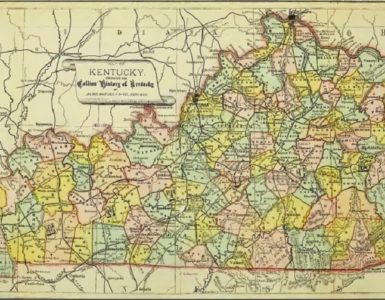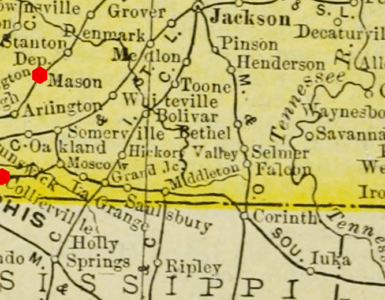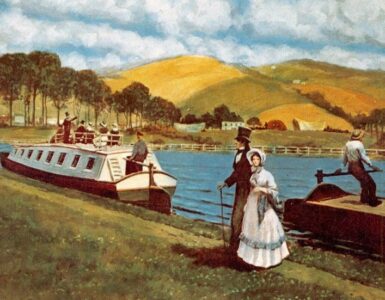This month marks the seventh year Presbyterians of the Past has been online. Among the 328 posts more than 170 are biographies including 34 of the first 35 moderators of the General Assembly of the Presbyterian Church in the United Sates of America (Samuel Miller is missing) and 14 moderators of the Presbyterian Church in the United States from its beginning in 1861 through 1923 (reunited with the PCUSA in 1983). A list of moderators through 1923 is available at “General Assembly Moderators.” Other categories include: Architecture, Church Design, Huguenots, Old Churches, and South Carolina. The category button is available on the toolbar.
Thank you for reading and linking my site. I hope it is helpful and encourages interest in church history as it unfolds the building of the Kingdom of God.
[The absence of a Samuel Miller biography has been rectified with, “Samuel Miller, Old Side Pastor & Professor” and now all 35 of the first moderators have biographies on this site.]
Barry Waugh
The following list provides links to some of my favorite posts
“Father Ross, Hoosier Presbyterians,” tells the life of John Ross who made his way from Dublin, Ireland, was kidnapped at sea, but became the father of Indiana Presbyterianism.
“William McWhir, Educator and Florida Missionary,” came from County Down Ireland and after coming to confessional Presbyterianism from closet-unitarian views was a missionary to Florida and he is credited with establishing the denomination in the state.
“John McElhenney, 1781-1871,” provides the life of the father of Presbyterianism in West Virginia. He was born in South Carolina and served the Old Stone Church in Lewisburg, West Virginia, from 1808 until his death in 1871. He also mastered an academy that included among its numerous graduates several that became ministers such as William S. Plumer.
“Francis L. Patton, Defender of the Faith,” provides the story of the only minister to be president of both Princeton Seminary and the University. Patton taught at McCormick Seminary before moving to Princeton. He grew up in Bermuda and was buried there when he passed away.
“Andrew W. Wilson, 1826-1897,” was the father of a missionary to Persia and a seminary professor. He is one of the few ruling elders written about on Presbyterians of the Past. As a wealthy merchant he supported missions, public education, and Western Theological Seminary where he was a board member.
“‘B’ is for Breckinridge,” is an introduction to the Presbyterian family in Kentucky that was influential not only in their state but also the nation. Links are provided in this article to the lives of Mary Cabell Breckinridge and her sons John, Robert Jefferson, and William Lewis, as well as one of her grandsons, Samuel Miller Breckinridge. A toolbar button is available for B. B. (Benjamin Breckinridge) Warfield who was a great-grandson of Mary Cabell. Benjamin’s younger brother’s biography is “Ethelbert D. Warfield, Higher Education.”
The Tennent family of ministers was important in American Presbyterian history not only for church ministry but also for education in the Log College. The article, “The Tennent Family and William Mackay Tennent,” provides information about their lives.
One article I enjoyed writing because the subject minister was appointed chaplain to West Point by his Washington congregant, President James K. Polk, is “William T. Sprole, James K. Polk, and West Point.” Sprole had a curious ministry in both the Old and New Schools, Congregationalism, and the German Reformed Church.
Two articles composed for the 400th anniversary of the Pilgrims arrival and settlement at Plymouth are–“Pilgrims & Plymouth: 400 Years Later,” and “Polity of the Plymouth Pilgrims.” These two articles are helpful for understanding their settlement and ecclesiology.
The only guest minister to write for Presbyterians of the Past is Pastor Terry L. Johnson of Independent Presbyterian Church, Savannah, Georgia. His article “Terry L. Johnson, China and the Reformed Faith” provides an account of his experience with the brethren in China.
Up until the end of the nineteenth century higher education in the United States was essentially Christian with denominations such as Baptists, Methodists, Congregationalists, and Presbyterians having colleges. One college founded in Greenville, South Carolina, was “Chicora College for Women.” A history of the College, a diagram of its mergers and moves, a scan of a promotional brochure, and a panoramic photograph of the Columbia campus used in later years are provided.
A few years ago after having thought about the idea for some time, I read the newspaper issues of a city for a calendar year to see what I could find. The result is “A Year in Greenville, South Carolina, 1893.” This is the condensed version of a lecture I had previously given.
This year is the 100th anniversary of the sermon “Shall the Fundamentalists Win?” which was delivered by Harry Emerson Fosdick. It is considered the instrument that brought before the public the issues leading to the Fundamentalist-Modernist Controversy of the 1920s. A few years ago I posted Dr. Fosdick’s, “The Golden Rule, Matthew 7:12,” which is from his book The Meaning of Service.
For me, one of the most interesting people in the history of South Carolina Presbyterianism is Zelotes Lee Holmes. He was a pastor, educator, astronomer, and builder. His biography is uncreatively titled, “Zelotes L. Holmes, 1815-1885.”
Possibly the most important confessional Presbyterian of Ireland in the nineteenth century was “Thomas Witherow, 1824-1890.” His writings were well known in the United States and they included not only theological and ecclesiastical subjects but also general history of Ireland. B. B. Warfield reviewed a Witherow ecclesiology title in the article “B. B. Warfield, Thomas Witherow, and Presbyterian Polity.”
Crossing over to the Continent and into Switzerland we find the influential minister-educator-historian, “J. H. Merle D’Aubigné, 1794-1872.” He is known for his multivolume history of the Reformation but there is more to him than just Reformation history. He was influenced by Robert Haldane and he defended the divinity of Christ in Geneva as John Calvin’s academy had come under the influence of Socinianism.
Two Presbyterian ministers in South Carolina that were educators as well as pastors were “Robert H. Reid, 1821-1907” and “William P. Jacobs, 1842-1917.” Both men were pastors that were influential for education with Reid founding schools for boys and girls in what came to be called Reidville, and Jacobs pastored First Church in Clinton, founded Presbyterian College, and Thornwell Orphanage.
Jesus warned us of wars and rumors of wars. The twentieth century had two world wars. The First World War, called The Great War in the era, created the mind set that questioned rightly ordained authority and led to the Lost Generation’s flappers, zoot suits, and The Charleston. The post, “Chap. T. M. Bulla, 1881-1918,”tells about a chaplain from Virginia who gave his life to save others in The Great War. One young man studying for the ministry at Western Theological Seminary joined the Lafayette Escadrille and when the United States entered the war in 1918 he became a flight instructor for the United States. “Lt. Joseph Volney Wilson, 1895-1918,” was killed a matter of weeks before the armistice November 11, 1918. Finally, a five-part series titled, “J. Gresham Machen, France 1918,” begins HERE with links at the end of each part to the next. Machen worked with the YMCA in France as a non-combatant.
“Chap. T. L. Kirkpatrick,” provides the life of one of two chaplains on the U. S. S. Arizona that died when the Japanese bombed Pearl Harbor and sunk the ship that is today a memorial to its dead as well as a symbol of the day that lives in infamy.
I conclude this catalog with the free download “Catalog, Parker Society Series, English Reformation,” “Matthew Henry, Presbyterian Minister and Bible Commentator,” and “Archbishop Matthew Parker’s Pastoral Problem.” The Parker Society Series were published in the nineteenth century to provide collections of selected works by a number of English reformers. The biography of Henry tells about his challenges as a dissenting minister in the village of Chester in Anglican England; the header image was taken by me in Chester. Parker’s problem was an incestuous marriage among his sheep that caused him great distress.





